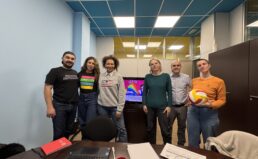The newly released IGLYO LGBTQI Inclusive Education Index and Map 2025 offers a sobering look at the state of LGBTQI inclusion in schools across Europe. While some countries made commendable advances, others have seen setbacks or stagnation. Lithuania presents a complex case—one of important legal milestones, but persistent gaps in implementation and support for LGBTQI students.
Legal Victory: A Landmark Ruling
One of the most significant developments for Lithuania came in December 2024, when the Constitutional Court ruled that a provision in the Law on the Protection of Minors Against the Detrimental Effect of Public Information—used to suppress LGBTQI content—was unconstitutional. This landmark decision, shaped by the European Court of Human Rights’ precedent in Macatė v. Lithuania, immediately invalidated Article 4(2)(16), which had long chilled discussions of LGBTQI topics in schools.
The court emphasized that excluding information about diverse family structures violated children’s right to receive objective, comprehensive education in a democratic society. The ruling expands the constitutional understanding of family to include not only traditional, marriage-based units but also relationships based on emotional attachment and mutual care—regardless of gender.
A Better Legal Framework, But Little Practical Progress
Despite this major legal step, IGLYO’s report shows that Lithuania’s overall educational environment for LGBTQI youth remains deeply inadequate. While the country scored relatively well (5/10) in anti-discrimination legislation and even better (7.5/10) for policies and action plans, its scores in most other categories remain at rock bottom.
The national curriculum, for instance, completely lacks LGBTQI-inclusive content (0/10), and there is no mandatory teacher training on LGBTQI awareness or inclusion (0/10). In fact, some existing teacher training materials contain homophobic content, such as framing homosexuality as a “mentally unhealthy behavior”—a view unchallenged by authorities despite civil society’s calls for reform since 2018.
Trans Rights and Legal Gender Recognition: Still Inaccessible
Legal gender recognition (LGR) is another area of concern. While some transgender individuals have been able to change their gender markers through court processes without surgery or sterilization, there is still no formal legal framework for LGR in Lithuania. Trans minors remain entirely excluded from such processes, and schools offer no clear policies for respecting students’ gender identity or preferred names.
In 2024, Lithuania’s Ombudsperson reiterated the need for LGR legislation, and a working group was established by the Ministry of Justice. However, the case L. v. Lithuania remains under the Council of Europe’s enhanced supervision, highlighting continued shortcomings in this area.
No Government Support Systems or Data Collection
Equally troubling is the government’s complete absence of support systems for LGBTQI students and their families. There is no public funding for inclusive education programs, nor any meaningful collaboration between the state and civil society on this front. Data collection on bullying and harassment based on sexual orientation or gender identity is virtually non-existent; NGOs like the National LGBT Rights Organization LGL are left to fill the gap.
LGL has taken commendable steps by launching an online support platform for LGBTQI youth and providing guidelines to educators on combating homophobic bullying. But without institutional backing or mandatory policy enforcement, these initiatives have limited reach and impact.
A Mixed Report Card
Lithuania’s total score across IGLYO’s 10 key indicators paints a stark picture:
Anti-discrimination legislation: 5/10
Policies and action plans: 7.5/10
Inclusive compulsory education curricula: 0/10
Mandatory teacher training: 0/10
Legal gender recognition: 0/10
Data collection on bullying: 0/10
Support systems for LGBTQI youth: 0/10
Information and guidelines: 0/10
School environment and partnerships: 0/10
International commitments: 5/10
These scores place Lithuania in a precarious middle ground—legally advancing in theory, but failing to translate that progress into everyday protection and inclusion for LGBTQI students in schools.
Looking Forward
The invalidation of Lithuania’s “anti-LGBTQI propaganda” provision marks a potential turning point. But as IGLYO stresses, legal reform alone is not enough. Without practical, school-level implementation—teacher training, inclusive curricula, reliable data, and institutional support—LGBTQI youth will continue to face exclusion and harm.
For Lithuania, the path forward lies in turning legal gains into lived equality. The foundation is there—what remains is the political and societal will to build on it.
Access IGLYO’s 2025 LGBTQI Inclusive Education Map & Index at education.iglyo.org.




